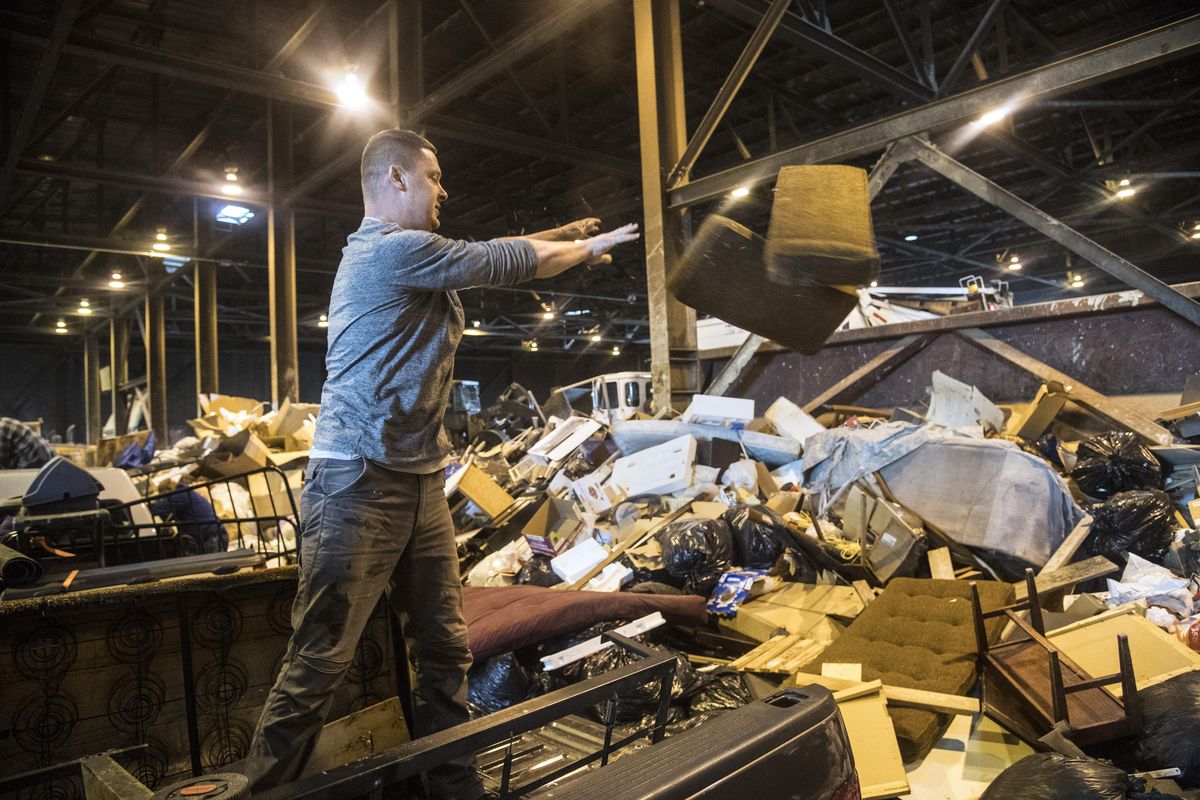Avista agrees to buy power from Spokane’s trash incinerator for 5 more years

A loader pushed a heap of garbage ever closer to a 40-foot-deep pit at Spokane’s Waste-to-Energy plant Tuesday afternoon, its effort punctuated by the echoing “pop” of a tire bursting and the tumbling of a child’s blue plastic swimming pool to the floor.
This trash, and the refuse waiting in a line of trucks idling outside the 26-year-old facility on the West Plains, represent not only the landfill space saved through burning but also millions of dollars of income for the city. This week, Spokane signed an extension of its deal with Avista Utilities Corp. to sell excess electricity generated at the plant, a deal valued at between $5 million and $5.5 million in each of the next five years.
“It’s a good chunk of revenue,” said Ken Gimpel, business services director for Spokane’s public works division.
Nearly 800 tons of garbage makes its way across the tipping floor each day at the facility, which burns the trash in two massive boilers 24 hours a day. Steam produced by the heat of those boilers, fed by natural gas cannons and reaching temperatures of 2,500 degrees Fahrenheit, powers a turbine that generates enough electricity to power 13,000 homes, according to the city.
A little less than a fifth of that energy is used to operate the plant, which is run by the city after it took over from private contractor Wheelabrator about three years ago. The rest winds up on Avista’s grid, powering homes and businesses in the Inland Northwest.
“This particular project adds energy and capacity to our system,” said Steve Silkworth, wholesale contracts manager for the utility. “It keeps your lights on in the winter.”
The deal is not affected by the proposed sale of Avista to Canadian utility Hydro One, city and Avista officials said.
The sale of power generated at the facility is less lucrative than it was years ago, due to a state law requiring utilities to invest in renewable energy. That law does not define the waste-to-energy model, popular in European countries but only practiced in Washington state at the West Plains plant, as renewable. The city has endeavored to change that designation, arguing the process saves landfill space and emissions are treated to comply with the state’s clean air laws.
The city had been selling its electricity to Puget Sound Energy, under an agreement signed before the state law went into effect. At the time of its expiration in 2011, the contract was worth about $12 million annually.
Because the power is not deemed renewable under the state law that took effect in 2012, its market value plummeted, said Gimpel. When the city went out to bid the energy generated at the plant, Avista made the only bid, and the price has dropped from about 9 cents per kilowatt hour under the Puget contract to between 3.8 cents to 5.2 cents per kilowatt hour under the contract the city agreed to Monday.
“Avista is hiring at a wholesale rate,” Gimpel said. “We were getting it, in essence, at a retail rate or higher.”
The state law requires utilities to produce 15 percent of their total energy output through renewable resources by the beginning of 2020.
State Rep. Marcus Riccelli, D-Spokane, said there have been several attempts to change the state law to include energy generated at the facility as renewable in the state law, but they’ve frequently been met with wariness by environmental advocates.
“People in Olympia are very wary to open up these regulations,” Riccelli said. “There’s concerns that other folks would want to tag on as well. Where do you stop?”
Once the trash is incinerated, the ashes are qualified as special waste because of potential contaminants and must be sent by train to a landfill in Klickitat County. High-powered magnets remove metals from the ash that can be resold by the city, said Kris Major, education coordinator at the plant.
Because the burned trash can’t be re-used, and the collection of usable metals costs time and money, the city would prefer residents take recyclable items to the sorting center operated by Waste Management next door, Major said. She pointed to piled cardboard waiting to be lifted into chutes for burning by a massive crane several stories above the tipping floor.
“Yes, we get energy from it. But once it’s burned, it is gone,” she said.
The agreement signed this week lasts for five years. At the end of 2019, Spokane’s other electricity purchasing agreement with Avista, from the city-owned Upriver Dam facility, will also come up for renewal. Gimpel said the city would like to explore options to sell the electricity potentially across state lines, where it might fetch a better price. The city is also interested in whether the electricity generated there could be used to support planned industrial development next to the nearby Spokane International Airport or exclusively to power other public facilities.
“We burn our citizen’s trash. If we used that energy to power City Hall, we think that would be a great story,” Gimpel said.